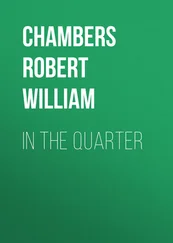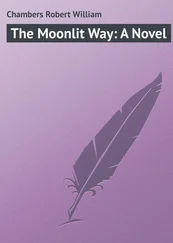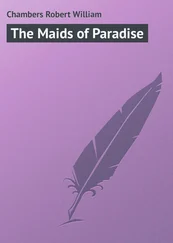"And he took the baby on his saddle in front of him and struck his spurs deep; and so came Sansa to Yian under a roaring rustle of black silk banners…. It is so written in the Book of Iron…. Allahou Ekber."
* * * * *
Cleves had leaned his elbow on the table, his forehead rested in his palm.
Perhaps he was striving in a bewildered way to reconcile such occult and amazing things with the year 1920—with the commonplace and noisy city of New York—with this pretty, modern, sunlit sitting–room in the Ritz–Carlton on Madison Avenue—with this girl in her morning negligee opposite, her coffee and melon fragrant at her elbow, her wonderful blue eyes resting on him.
"Sansa," he repeated slowly, as though striving to grasp even a single word from the confusion of names and phrases that were sounding still in his ears like the vibration of distant and unfamiliar seas.
"Is this the girl you were talking with just now? In—in this room?" he added, striving to understand.
"Yes."
"She wasn't here, of course."
"Her body was not."
"Oh!"
Tressa said in her sweet, humorous way: "You must try to accustom yourself to such things, Victor. You know that Yulun talks to me…. I wanted to talk to Sansa. The longing awakened me. So— I made the effort ."
"And she came—I mean the part of her which is not her body."
"Yes, she came. We talked very happily while I was bathing and dressing. Then we came in here. She is such a darling!"
"Where is she?"
"In Yian, feeding her silk–worms and making a garden. You see, Sansa is quite wealthy now, because when the Japanese came she filled a bullock cart with great lumps of spongy gold from the Temple and filled another cart with Yu–stone, and took the Hezar of Baroulass horsemen on guard at the Lake of the Ghosts. And with this Keutch, riding a Soubz horse, and dressed like an Urieng lancer, my pretty little comrade Tchagane, who is called Sansa, marched north preceded by two kettle–drums and a toug with two tails―"
Tressa's clear laughter checked her; she clapped her hands, breathless with mirth at the picture she evoked.
"Kai!" she laughed; "what adorable impudence has Sansa! Neither Tchortcha nor Khiounnou dared ask her who were her seven ancestors! No! And when her caravan came to the lovely Yliang river, my darling Sansa rode out and grasped the lance from her Tougtchi and drove the point deep into the fertile soil, crying in a clear voice: 'A place for Tchagane and her people! Make room for the toug!'
"Then her Manggoud, who carried the spare steel tip for her lance, got out of his saddle and, gathering a handful of mulberry leaves, rubbed the shaft of the lance till it was all pale green.
"'Toug iaglachakho!' cries my adorable Sansa! 'Build me here my Urdu! [2] Urdu = An imperial encampment.
—my Mocalla! [3] Mocalla = A platform used as a Moslem pulpit.
And upon it pitch my tent of skins!"
Again Tressa's laughter checked her, and she strove to control it with the jade ring pressed to her lips.
"Oh, Victor," she added in a stifled voice, looking at him out of eyes full of mischief, "you don't realise how funny it was—Sansa and her toug and her Urdu—Oh, Allah!—the bones of Tchinguiz must have rattled in his tomb!"
Her infectious laughter evoked a responsive but perplexed smile from Cleves; but it was the smile of a bewildered man who has comprehended very little of an involved jest; and he looked around at the modern room as though to find his bearings.
Suddenly Tressa leaned forward swiftly and laid one hand on his.
"You don't think all this is very funny. You don't like it," she said in soft concern.
"It isn't that, Tressa. But this is New York City in the year 1920. And I can't—I absolutely can not get into touch—hook up, mentally, with such things—with the unreal Oriental life that is so familiar to you."
She nodded sympathetically: "I know. You feel like a Mergued Pagan from Lake Baïkal when all the lamps are lighted in the Mosque;—like a camel driver with his jade and gold when he enters Yarkand at sunrise."
"Probably I feel like that," said Cleves, laughing outright. "I take your word, dear, anyway."
But he took more; he picked up her soft hand where it still rested on his, pressed it, and instantly reddened because he had done it. And Tressa's bright flush responded so quickly that neither of them understood, and both misunderstood.
The girl rose with heightened colour, not knowing why she stood up or what she meant to do. And Cleves, misinterpreting her emotion as a silent rebuke to the invasion of that convention tacitly accepted between them, stood up, too, and began to speak carelessly of commonplace things.
She made the effort to reply, scarcely knowing what she was saying, so violently had his caress disturbed her heart,—and she was still speaking when their telephone rang.
Cleves went; listened, then, still listening, summoned Tressa to his side with a gesture.
"It's Selden," he said in a low voice. "He says he has the Yezidee Arrak Sou–Sou under observation, and that he needs you desperately. Will you help us?"
"I'll go, of course," she replied, turning quite pale.
Cleves nodded, still listening. After a while: "All right. We'll be there. Good–bye," he said sharply; and hung up.
Then he turned and looked at his wife.
"I wish to God," he muttered, "that this business were ended. I—I can't bear to have you go."
"I am not afraid…. Where is it?"
"I never heard of the place before. We're to meet Selden at 'Fool's Acre.'"
"Where is it, Victor?"
"I don't know. Selden says there are no roads,—not even a spotted trail. It's a wilderness left practically blank by the Geological Survey. Only the contours are marked, and Selden tells me that the altitudes are erroneous and the unnamed lakes and water courses are all wrong. He says it is his absolute conviction that the Geological Survey never penetrated this wilderness at all, but merely skirted it and guessed at what lay inside, because the map he has from Washington is utterly misleading, and the entire region is left blank except for a few vague blue lines and spots indicating water, and a few heights marked '1800.'"
He turned and began to pace the sitting–room, frowning, perplexed, undecided.
"Selden tells me," he said, "that the Yezidee, Arrak Sou–Sou, is in there and very busy doing something or other. He says that he can do nothing without you, and will explain why when we meet him."
"Yes, Victor."
Cleves turned on his heel and came over to where his wife stood beside the sunny window.
"I hate to ask you to go. I know that was the understanding. But this incessant danger—your constant peril―"
"That does not count when I think of my country's peril," she said in a quiet voice. "When are we to start? And what shall I pack in my trunk?"
"Dear child," he said with a brusque laugh, "it's a wilderness and we carry what we need on our backs. Selden meets us at a place called Glenwild, on the edge of this wilderness, and we follow him in on our two legs."
He glanced across at the mantel clock.
"If you'll dress," he said nervously, "we'll go to some shop that outfits sportsmen for the North. Because, if we can, we ought to leave on the one o'clock train."
She smiled; came up to him. "Don't worry about me," she said. "Because I also am nervous and tired; and I mean to make an end of every Yezidee remaining in America."
"Sanang, too?"
They both flushed deeply.
She said in a steady voice: "Between God and Erlik there is a black gulf where a million million stars hang, lighting a million million other worlds.
"Prince Sanang's star glimmers there. It is a sun, called Yramid. And it lights the planet, Yu–tsung. Let him reign there between God and Erlik."
Читать дальше












